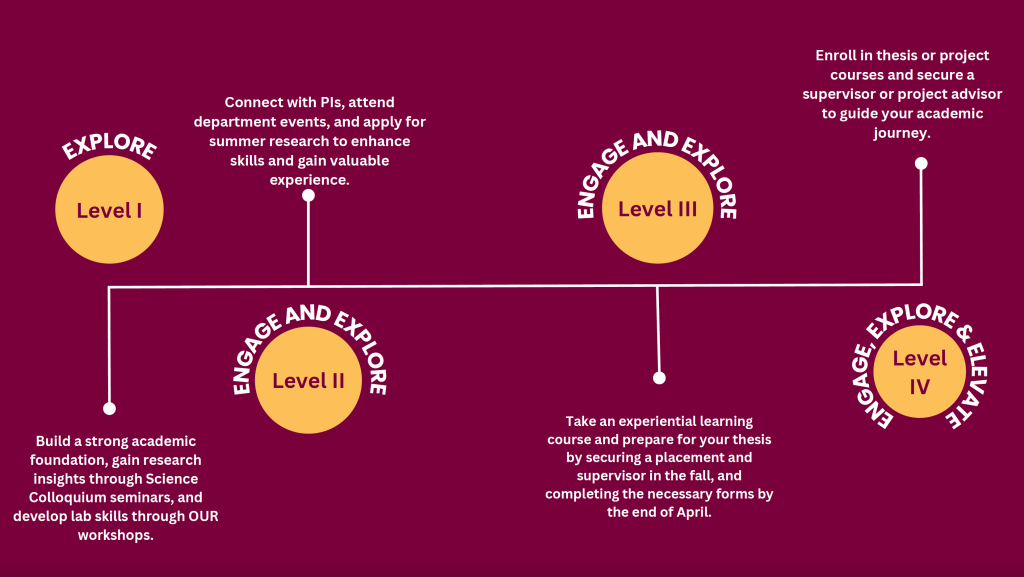
Expandable List
During the academic year:
- Become a mentee in affiliation with the MSS mentors
- Build a strong academic foundation to lay the groundwork for future research opportunities.
- Attend seminars that are part of the Science Colloquium organized by the OUR to learn about the research being conducted at McMaster
- Apply to the Level I and II Summer Research Experiences offered by the OUR (Application due dates tbd)
- If you are staying in Hamilton over the summer, consider applying to the summer student-work program. There are many campus jobs available including lab and research jobs.
- Attend the skills workshops and the Department workshops organized by the OUR to develop your lab/research skills and learn about procedures/methods that are being used in research at McMaster
Summer After First Year:
- Begin looking further into the research being conducted at McMaster, decide which PI’s research interests you the most, and start drafting/ sending emails to show your interest in contributing to their research.
- To secure a volunteer position in a lab during second year, now would be the time to reach out to PIs. You do not have to start volunteering in research in second year – starting in third year is perfectly okay.
- If you choose a specialization that offers co-op, or you want to take an experiential learning course in third year, enroll in SCIENCE 2C00 in June so you can take it in your second year (it is a pre-requisite for co-op and some experiential courses)
- If you want to have a part time job for the academic year, consider applying to the fall/winter student-work program.
During the academic year:
- Continue reaching out to PIs about volunteer opportunities
- Attend the Information nights held by your department where you can learn more about the research your professors are doing and the opportunities available
- Attend seminars that are part of the Science Colloquium
- Apply to the Level I and II Summer Research Experiences offered by the OUR (Application due dates tbd)
- Throughout the year, search for summer research opportunities- it’s better to start early (as early as the fall).
- Start looking into experiential learning courses for third year and where you could potentially get a placement- Application due dates can be as early as July
- If you are staying in Hamilton over the summer, consider applying to the summer student-work program (Applications open in March) OR NSERC- USRA
- Take courses or attend workshops provided by OUR to strengthen your data analysis and research method skills and understanding
- Make a LinkedIn profile if you haven’t already, and begin to make connections
Summer After Second Year:
- Enroll/Apply to an experiential learning course for the fall and/or winter terms if you want to gain hands on learning experience
- If you are not already volunteering, reach out to PIs so start volunteering in the fall
- Consider taking an experiential learning course (this is good preparation for a thesis).
- Try to secure your placement and supervisor in the fall – the earlier the better.
- Permission forms, a secured placement and supervisor for your thesis should be completed by the end of April.
- If you are staying in Hamilton over the summer, consider applying to the summer student-work program (Applications open in March) OR NSERC-USRA
- Consider an internship related to your field of study to gain practical experience and expand your professional network.
- Explore work-integrated learning opportunities that allow you to apply classroom knowledge in real-world work settings.
- Consider a thesis, identifying a focused topic and establishing a clear research methodology.
- Undertake an independent project that showcases your creativity and ability to work autonomously, further enhancing your skills and knowledge in your chosen field.
